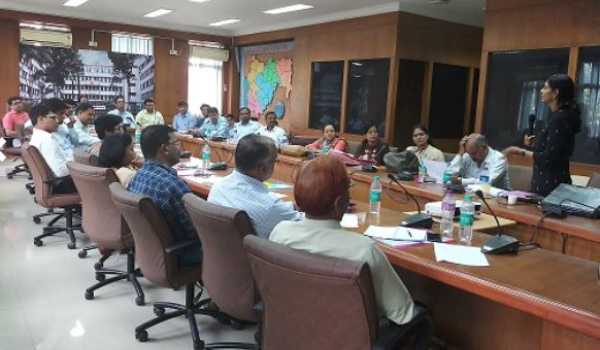
Integrating Gender in Medical Education: A Guide for Medical Teachers of Obstetrics & Gynaecology on the MBBS Course
The Maharashtra University of Health Sciences has taken an important step towards gender mainstreaming and gender sensitisation by suggesting gender-integrated modules in the existing MBBS curriculum. The MBBS is the Bachelor of Medicine/Bachelor of Surgery degree, the primary medical degree. This is part of a larger project on “Integrating Gender into Medical Education” under the aegis of Maharashtra University of Health Sciences by the Directorate of Medical Education and Research, and the Centre for Enquiry into Health and Allied Themes (CEHAT), with support from UNFPA. The modules were tested in three of the seven medical colleges of Maharashtra. Medical educators are currently being trained to use these modules.
CEHAT has been working on the issue of women and health since its inception. It has been able to generate critical evidence in policy, programmes and practice. It has also been at the forefront in policy and legal advocacy on the issues of access to abortion services, gender insensitivity in healthcare responses to violence against women and sex selection/determination. The work also involved gender sensitisation of health care providers and has been ongoing. A common issue that emerged was the need to impact the medical curriculum and make it gender sensitive so that doctors are sensitive to gender concerns when they enter the field.
In the Integrating Gender into Medical Education initiative, building on earlier experiences in India and abroad, CEHAT decided to work closely with medical professors across seven medical colleges in Maharashtra to train them as core faculty and bring about changes in the medical curriculum in consultation with them. This was probably the best strategy as once the 19 professors completed the GME training, they were able to identify the gender gaps for every lecture in the prescribed MBBS curriculum. Later, the CEHAT team along with the mentors and gender experts developed the gender content for each lecture. This was again reviewed by all the 19 trained faculty, mentors and gender experts.
The modules are supplementary efforts to the existing MBBS curriculum and are structured with key messages for medical educators and knowledge, skills and attitude changes expected in medical students. The section on content in the modules specifically provide examples of gender concerns related to health conditions and details of steps by which gender can be integrated into a specific medical topic. Each module has a list of resources which can be read by the educator at their convenience. Case studies, debates, group discussions have been included as participatory exercises to assist medical educators in engaging students on gender and health.
A total of 31 lectures covering seven semesters are listed in the table of contents. All aspects of sexual and reproductive health in obstetrics & gynaecology are covered. The abortion law of India and abortion in the first and second trimesters are the subject of lecture 18. The gender content added is “Right to choose continuation or discontinuation of pregnancy, difference between the MPT Act (abortion law) and PCPNDT Act (law against sex determination), and women-centred post-abortion contraceptive services. With Lecture 27 on drugs used in obstetric practice, the gender content added is to do with over-the-counter abortifacient drugs and reasons.
Lastly, the integration of gender in medical education has taken place for five other disciplines as well as obstetrics & gynaecology – for internal medicine, community medicine, forensics, toxicology, and psychiatry.
SOURCES: Sangeeta Rege, CEHAT, 29 November 2018 ; Integrating Gender in Medical Education, Obstetrics & Gynaecology MBBS Course, A Guide for Medical Teachers, 2017. ISBN: 978-81-89042-75-0.
To get a copy, write to the Centre for Enquiry into Health and Allied Themes at: cehat@vsnl.com
PHOTO: CEHAT website, Orientation to the Modules, 20-22 June 2018



